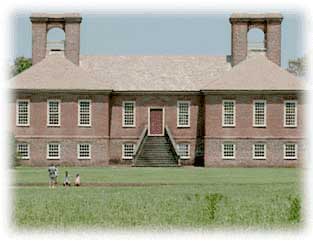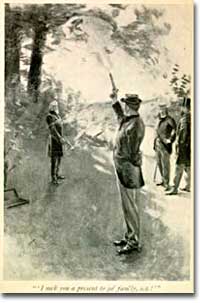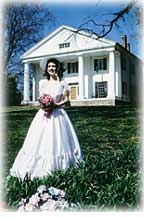27c. The Plantation & Chivalry

Southern belles, gentlemen, and hospitality.
During the 1600s, patterns of life were borrowed from the English countryside and transplanted onto America's southern shores. These included a glorification of riding, hunting, and etiquette.
Tobacco played the central role in defining social class, local politics, the labor system; in fact, it shaped the entire life of the region. The planter was essentially a country gentleman, looking to England for political and economic guidance as well as for its literature, manner of dress, and etiquette. In the 1700s the Virginia gentry established a code of behavior that can still be seen in parts of the south today. Aristocrats had certain rights and privileges, and, in return, had certain responsibilities for their "inferiors." By around 1825, the dominance of Virginia was fading and the emergence of King Cotton shifted the center of Southern influence to South Carolina, Georgia, Alabama and Mississippi.

Southern cavaliers would sometimes engage in duel to defend their honor.
The southern code addressed the behaviors of both men and women. Gentlemen must be courteous, truthful and honorable. Sins of the flesh were forgiven. He should have a broad understanding of the humanities, including the Greek and Roman classics. Hospitality and generosity were of utmost importance. The ideal man respected his family and treated women with high regard. Strength and courage were glorified. A man was to defend the family name, with his life if necessary. A personal insult to an individual or his family would necessitate a fight, if not a duel.

The manners befitting a proper southern belle were as detailed as those befitting her male counterpart.
The southern woman was genteel and gracious. She knew how to entertain guests and tenaciously defended her husband and children. She was not outspoken and was pure of mind and body.
A proper gentleman, it was believed, should be a lawyer, politician, planter, or military man, rather than be a businessman or other occupation. Because plantation owners had their money tied up in property and slaves, many of the generation could not afford to send their children to prestigious colleges, but were able to send them to the esteemed military schools. This created a generation of very able and talented military officers. Many were trained at West Point and Virginia Military Institute. They held to old-fashioned ideals of what honorable warfare meant. When the Civil War arrived, most of the military leadership talent was southern.






